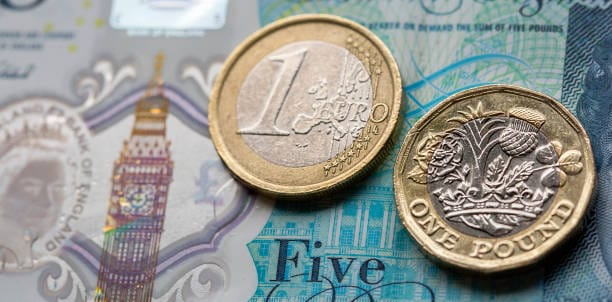GBP/EUR exchange rate midweek update: pound slumps to 13-week low versus euro
The pound euro (GBP/EUR) exchange rate plummeted below the 1.16 benchmark for the first time since May amid Bank of England rate cut speculation and a risk-off market mood.

(05/08/2024 to 07/08/2024)
Monday
The pound euro (GBP/EUR) exchange rate cratered amid a risk-averse market mood that saw safe-haven flows favour the single currency.
The pair fell to a fraction above 1.16 – a 12-week low – as a global market selloff sapped support for the increasingly risk-sensitive UK currency. This was compounded by market bets on further interest rate cuts from the Bank of England (BoE), which increased pressure on the pound following the central bank’s first cut since 2020 last week.
Although BoE rate-setters cautioned against back-to-back rate cuts in the wake of last week’s announcement, markets are pricing in at least two more cuts by the end of the year.
The UK’s final services PMI indicated a slightly faster-than-expected acceleration in activity last month due to easing inflation. This failed to buoy the pound as it added to BoE rate cut bets.
Tuesday
Having recovered slightly, the pound euro rate softened again amid stronger-than-forecast German manufacturing data that supported the euro.
German manufacturing orders rose in June for the first time this year. Industrial orders were 3.9% higher than the prior month, rebounding after they fell 1.7% in May and outstripping the 0.8% expected – encouraging numbers that stoked hopes Europe’s largest economy is recovering.
The euro’s gains were capped, however, by underwhelming Eurozone retail sales data for June that reported sales fell by 0.3% rather than the 0.1% forecast.
Meanwhile, the pound continued to be hindered by BoE rate cut speculation following Monday’s market selloff.
A better-than-expected UK construction PMI failed to lend the UK currency support, with July’s reading printing at 55.3 – a 26-month high – above forecasts of 52.7.
Wednesday
The pound euro rate touched a 13-week low just below 1.16.
A lack of market-moving data from the UK economy and ongoing speculation about the pace of the BoE’s rate-cutting cycle extended the pound’s decline. This was compounded by ongoing social unrest in the UK
Looking ahead
A shortage of data from the UK economy could leave the pound exposed to mounting BoE rate cut bets and market risk appetite.
Meanwhile, the main catalyst for euro movement could be the German CPI on Friday, which is expected to show inflation remained at 2.6% in July in the Eurozone’s largest economy – a sticky reading that could support the single currency by dampening European Central Bank (ECB) rate cut expectations.
